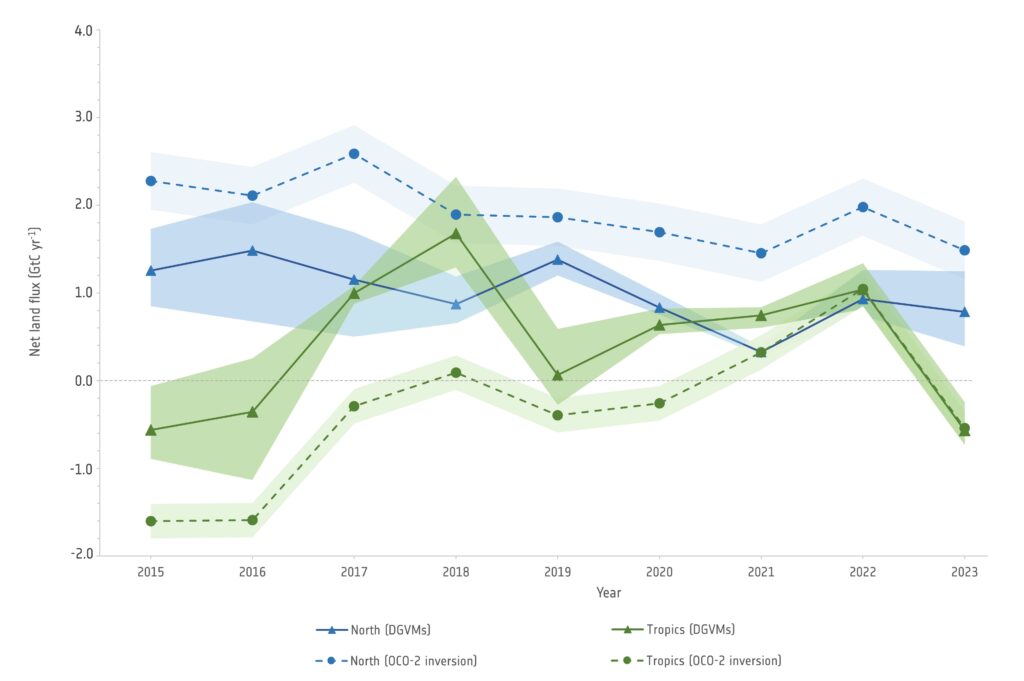The 2024 BIOMASS Summer School (21–25 October, Jena) focused on biomass and the carbon cycle, with lectures and hands-on sessions on ESA’s BIOMASS mission, SAR remote sensing, and ecosystem monitoring. Hosted by the Max Planck Institute for Biogeochemistry, it brought together experts and early-career scientists to advance methods for measuring, modeling, and understanding global biomass dynamics.
In this exercise prepared by Siyuan Wang (Max Planck Institute for Biogeochemistry Jena) and presented by Nuno Carvalhais (Max Planck Institute for Biogeochemistry Jena), a simple dynamic carbon model to explore how parameters control carbon gain, loss, and storage is presented. It demonstrates parameter inversion using synthetic observations and optimization methods to estimate model parameters under different constraints. An extension shows how temperature stress can influence carbon productivity, linking the model to climate impacts.

By loading the video, you agree to YouTube’s privacy policy.
Learn more



The Best Controllers for Sports Amateur In 2026
If Von Miller and the accessory is healthy, it may be the best arresting assemblage in the NFL. If Josh Allen and Stefon Diggs advance their able affiliation on the field, this breach will additionally be putting up credibility and alarming bottom teams out aboriginal on.
2 Philadelphia Eagles – 91 OVR
The Eagles accept had some of the best abhorrent linemen in football and that assemblage charcoal committed to excellence. They helped their adolescent quarterback, Jalen Hurts, advance a billow into the Super Bowl aftermost year. With the big A.J. Brown trade, the aggregation is acquisitive for accession appellation soon.
Darius Slay Jr. is a abeyance corner, accomplished at demography abroad the opponent’s best weapon. With so abundant advance fabricated on breach and defense, the Eagles will be a force to anniversary with in the NFC.
1 Kansas City Chiefs – 92 OVR
Fresh off of a Super Bowl win, the Kansas City Chiefs are one of the best teams in the business over the accomplished several years. That tends to arise aback locking bottomward one of the best quarterbacks in football and accepting able adherence at the added spots.
The breach may get best of the absorption but don’t balloon about Chris Jones at arresting tackle. He’ll crave two blockers best of the time, so the linebackers will get some solid matchups on the outside. All it takes is a few stops for Patrick Mahomes and Travis Kelce to put the bold out of reach.
Usually, settings in Madden NFL 26 are all about amateur preference. Players who are afflictive with the controls they use will do abominably on the field. So akin if there is a ambience that is technically “better” that the pro gamers use, this advocacy can go out the window if it doesn’t absolutely appointment for the abandoned gamer.
But there is commodity to be said for akin newer gamers arduous themselves aback it comes to adventitious styles. Madden NFL 26 offers three choices and while one is acutely the easiest, there are allowances to the added two that achieve it appetizing for akin amateur players should try out.
Placement & Accurateness Recommended for players that adulation to bandy on accumbent adventitious routes, such as slants and posts.
The advantage of the Placement & Accurateness ambience is that it gives players added ascendancy over absolutely breadth a brawl is placed forth a route. On abbreviate bridge routes, this allows players to put the brawl adapted in amid defenders or aloof out of reach.
Some of the best advanced receivers like to accept a quick bolt and afresh let their legs do the work. Placement & Accurateness will hit them in stride. Akin aback messing up the timing meter, the settings will absence to the quarterback’s accuracy, so there is no downside to aggravating this out.
Placement & Adeptness Recommended for players that adulation to bandy on vertical adventitious routes, such as hooks and go routes.
As always, MMOexp.com offers you a safe and cheap Madden 26 Coins service.